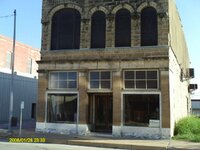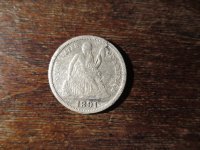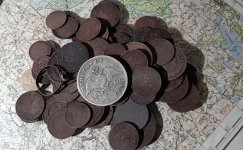cccalco
Full Member
- Jul 16, 2009
- 205
- 94
- Primary Interest:
- Other
[LITTLE ROCK] OLD-LINE DEMOCRAT 1860
[Note: this newspaper was filmed slightly out of focus—it is very difficult to read.
Many articles were skipped because they were illegible.]
http://www.uttyler.edu/vbetts/little_rock_old-line_democrat.htm
[LITTLE ROCK] OLD-LINE DEMOCRAT, April 5, 1860, p. 3, c. 1
The K. G. C's.
The K. G. C.'s are collecting in considerable numbers at New Orleans. Gen. Bickley, the commander-in-chief, col. Temple, and Surgeon Semple, are at the St. Louise Hotel; Gen. Greer, who is well known as one of the bravest volunteer colonels from Mississippi during the recent war, and who now commands a division of the K. G. C., together with Major Richardson, one of his staff officers, and Col. H. C. Young, of Memphis, who commands the First Tennessee Regiment, are at the City Hotel; while others, as Captain Scott and Lieut. Breese, are at the Merchants'; Capt. Gray, the wagon master, is at the Texas Home; and still many others of note and character are at the St. Charles, or quartered with private friends in the city. Besides, says the N. O. Courier, there are hundreds of our own citizens in hourly contact with these gentlemen, so that one can not but inquire, "What's in the wind?" The K. G. C. or "Knights of the Golden Circle," was organized in 1854, more to cultivate the martial spirit of our people than anything else; since then it has steadily grown, until now it numbers over 30,000 members, who are scattered over the Southern States, and holding within its charmed circle many of our most influential men and best soldiers. No organization of the kind has in this country ever combined so much talent with such immense financial resources, and under the present aspect of political affairs, we do not deem it too much to say that the whole nation may soon become deeply interested in the ultimate labors of the K. G. C.
It is generally understood that the K. G. C. are preparing to operate in the broad field which civil war has opened in Mexico to American enterprise and industry.
[LITTLE ROCK] OLD-LINE DEMOCRAT, August 16, 1860, p. 2, c. 2
Knights of the Golden Circle.—General Bickley has published an address to the Knights of the Golden Circle, requesting them to repair to their Texas encampment by the 15th of September. He declares the object of the association to be to Americanize and Southernize Mexico. The Knights will go to Mexico as emigrants, under the sanction of the Mexican government. The order is said to number fifty thousand members, with a capital of one million of dollars. Texas has subscribed nearly half a million of dollars, and a general call is made upon other States to donate liberally, as the object is to establish a Southern confederacy.
[LITTLE ROCK] OLD-LINE DEMOCRAT, September 20, 1860, p. 2, c. 7
Knights of the Golden Circle.—It is a fact well known to all who read the public journals of the day that there is a party in the Southern portion of this Union that has been organized for the purpose of colonizing Mexico. This party is known as the Knights of the Golden Circle, and have continued to increase so rapidly that from five men, they have in three years reached the formidable number of fifty thousand. These men were scattered through the country from the mountains of Virginia to the Gulf of Mexico, and for some time have been awaiting orders to concentrate at some point convenient to the scene of their future operations. Gradually these men have been sent through the country, and are now collecting on the confines of Texas. Already large numbers of them are concentrated in that State, and this nucleus is being surrounded by men from all the various States.
The first movement of the K. G. C's from Virginia will take place to-morrow from the little town of Hampton. One company, in command of a competent officer and a worthy Virginia gentleman, will embark for Texas, and will then inaugurate the exodus of the K. G. C's. That the object of this organization is to change the political and social principles of the country to which they go, there is little doubt, for they avow this their purpose; but they do not go unlawfully armed, at least from here; they profess to go as peaceful citizens and will revolutionize that unhappy country not by fire and sword, but by settling in sufficient numbers within its borders, and changing and making wholesome laws, and seeing that they are enforced. They are going to introduce Anglo-Saxon energy and American prudence among a people who have heretofore been incapable of self-government, and who are actually inviting them to come and teach them how to live and be happy.
The movement of these men toward the Rio Grande is pregnant with much importance to the South, and is the commencement of a grand programme that has been preparing for several years.—Norfolk Day Book.
[Note: this newspaper was filmed slightly out of focus—it is very difficult to read.
Many articles were skipped because they were illegible.]
http://www.uttyler.edu/vbetts/little_rock_old-line_democrat.htm
[LITTLE ROCK] OLD-LINE DEMOCRAT, April 5, 1860, p. 3, c. 1
The K. G. C's.
The K. G. C.'s are collecting in considerable numbers at New Orleans. Gen. Bickley, the commander-in-chief, col. Temple, and Surgeon Semple, are at the St. Louise Hotel; Gen. Greer, who is well known as one of the bravest volunteer colonels from Mississippi during the recent war, and who now commands a division of the K. G. C., together with Major Richardson, one of his staff officers, and Col. H. C. Young, of Memphis, who commands the First Tennessee Regiment, are at the City Hotel; while others, as Captain Scott and Lieut. Breese, are at the Merchants'; Capt. Gray, the wagon master, is at the Texas Home; and still many others of note and character are at the St. Charles, or quartered with private friends in the city. Besides, says the N. O. Courier, there are hundreds of our own citizens in hourly contact with these gentlemen, so that one can not but inquire, "What's in the wind?" The K. G. C. or "Knights of the Golden Circle," was organized in 1854, more to cultivate the martial spirit of our people than anything else; since then it has steadily grown, until now it numbers over 30,000 members, who are scattered over the Southern States, and holding within its charmed circle many of our most influential men and best soldiers. No organization of the kind has in this country ever combined so much talent with such immense financial resources, and under the present aspect of political affairs, we do not deem it too much to say that the whole nation may soon become deeply interested in the ultimate labors of the K. G. C.
It is generally understood that the K. G. C. are preparing to operate in the broad field which civil war has opened in Mexico to American enterprise and industry.
[LITTLE ROCK] OLD-LINE DEMOCRAT, August 16, 1860, p. 2, c. 2
Knights of the Golden Circle.—General Bickley has published an address to the Knights of the Golden Circle, requesting them to repair to their Texas encampment by the 15th of September. He declares the object of the association to be to Americanize and Southernize Mexico. The Knights will go to Mexico as emigrants, under the sanction of the Mexican government. The order is said to number fifty thousand members, with a capital of one million of dollars. Texas has subscribed nearly half a million of dollars, and a general call is made upon other States to donate liberally, as the object is to establish a Southern confederacy.
[LITTLE ROCK] OLD-LINE DEMOCRAT, September 20, 1860, p. 2, c. 7
Knights of the Golden Circle.—It is a fact well known to all who read the public journals of the day that there is a party in the Southern portion of this Union that has been organized for the purpose of colonizing Mexico. This party is known as the Knights of the Golden Circle, and have continued to increase so rapidly that from five men, they have in three years reached the formidable number of fifty thousand. These men were scattered through the country from the mountains of Virginia to the Gulf of Mexico, and for some time have been awaiting orders to concentrate at some point convenient to the scene of their future operations. Gradually these men have been sent through the country, and are now collecting on the confines of Texas. Already large numbers of them are concentrated in that State, and this nucleus is being surrounded by men from all the various States.
The first movement of the K. G. C's from Virginia will take place to-morrow from the little town of Hampton. One company, in command of a competent officer and a worthy Virginia gentleman, will embark for Texas, and will then inaugurate the exodus of the K. G. C's. That the object of this organization is to change the political and social principles of the country to which they go, there is little doubt, for they avow this their purpose; but they do not go unlawfully armed, at least from here; they profess to go as peaceful citizens and will revolutionize that unhappy country not by fire and sword, but by settling in sufficient numbers within its borders, and changing and making wholesome laws, and seeing that they are enforced. They are going to introduce Anglo-Saxon energy and American prudence among a people who have heretofore been incapable of self-government, and who are actually inviting them to come and teach them how to live and be happy.
The movement of these men toward the Rio Grande is pregnant with much importance to the South, and is the commencement of a grand programme that has been preparing for several years.—Norfolk Day Book.






